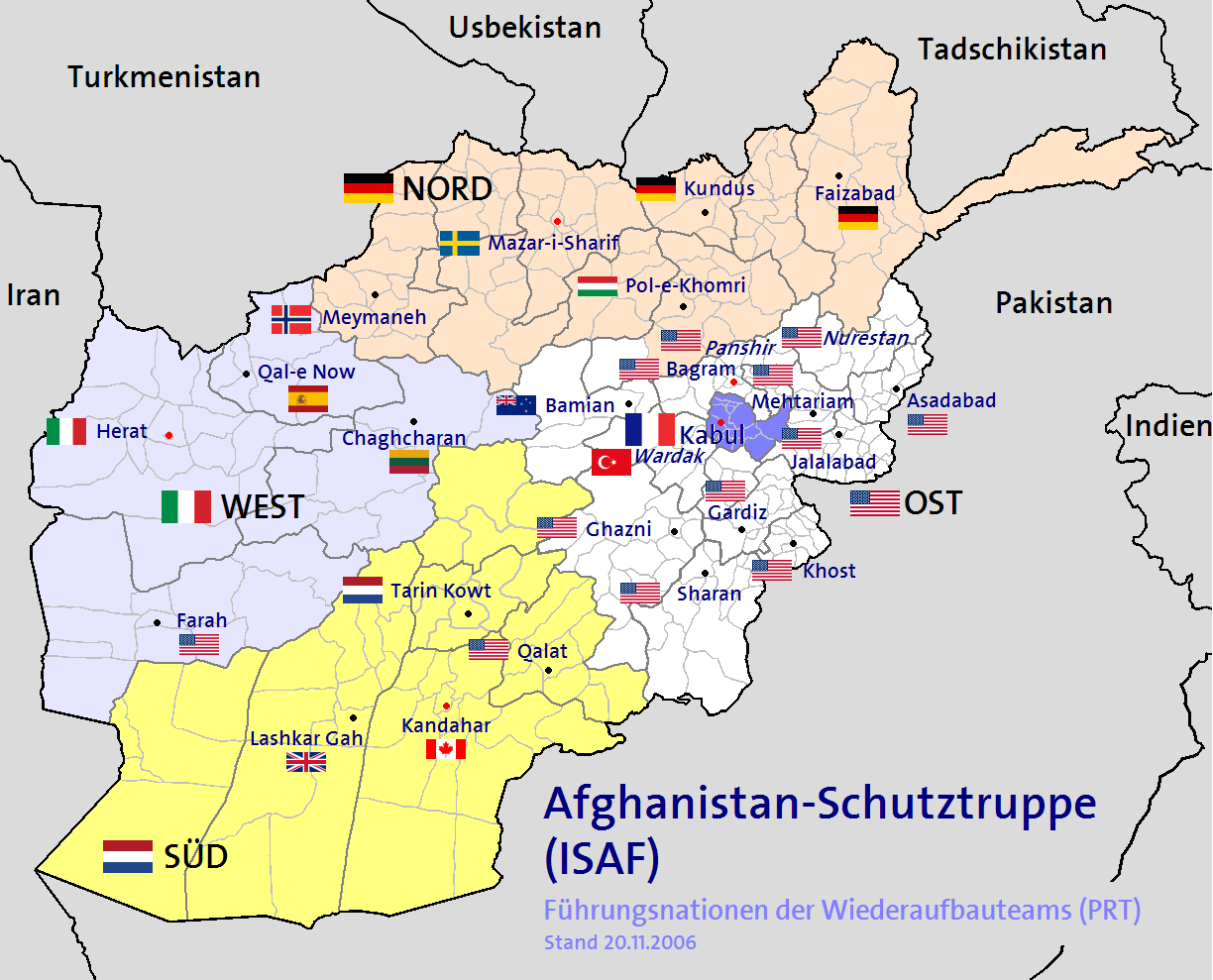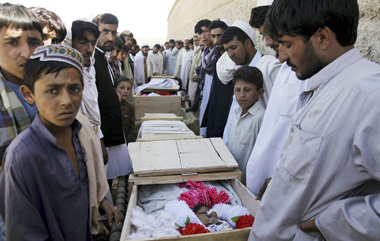 Anhaltender Rechtsbruch
14.12.2010
Anhaltender Rechtsbruch
14.12.2010Bei NATO-Angriffen getötete Afghanen gelten grundsätzlich als Aufständische (Khogyani, 19. September 2010)
Foto: AP
Afghanistan
Governor: NATO Offensive Killed 64 Civilians in Afghanistan’s Kunar Province February 20, 2011
NATO Insists It Has Video Showing Killing of 'Armed Insurgents'
by Jason Ditz
A four day NATO offensive in Afghanistan’s Kunar Province has left at least 64 innocent civilians dead and several others wounded, according to both the provincial governor and the provincial police chief. ...
 Anhaltender Rechtsbruch
14.12.2010
Anhaltender Rechtsbruch
14.12.2010
Bei NATO-Angriffen getötete Afghanen gelten grundsätzlich als
Aufständische (Khogyani, 19. September 2010)
Foto: AP
Krieg und Besatzung in Afghanistan verstoßen gegen die UN-Charta, den NATO-Vertrag, die Genfer Konventionen und das Grundgesetz
Von Gregor Schirmer
Erstens. Es es gibt zwar bis heute noch keine allgemein anerkannte und verbindliche Definition von »Terrorismus«. Aber es steht wohl außer Zweifel: Die Anschläge vom 11. September 2001 in den USA waren ein schweres Verbrechen sowohl nach dem innerstaatlichen Recht der Vereinigten Staaten von Amerika als auch nach den damals gültigen Normen des Völkerrechts. Dieses Verbrechen hätte auf der internationalen Ebene mit den im Völkerrecht vorgesehenen Mitteln der Zusammenarbeit der Staaten auf polizeilichem und justitiellem Gebiet verfolgt werden müssen und können. Dazu wurde nicht der geringste Versuch unternommen. Statt dessen ...
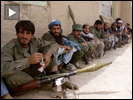 Killing
Reconciliation: Military Raids, Backing of Corrupt Government Undermining Stated
US Goals in Afghanistan October 29, 2010
Killing
Reconciliation: Military Raids, Backing of Corrupt Government Undermining Stated
US Goals in Afghanistan October 29, 2010
The Obama administration says it is backing a strategy of reconciliation with the Taliban. But just back from Afghanistan, unembedded investigative journalists Jeremy Scahill and Rick Rowley say night raids by US Special Operations are killing the reconciliation the administration claims to support.
(...) AMY GOODMAN: I want to ask you about—this is from McClatchy—US claims of Afghan peace talks a 'psychological operation,' says an official. New doubts are being raised over reports the Obama administration is backing peace talks between the Afghan government and the Taliban. US officials have claimed they’ve allowed senior Taliban leaders to enter Afghanistan for meetings with Afghan leaders, with some even flying aboard a NATO aircraft. But McClatchy Newspapers reports several US officials and experts see the claims as part of an "information strategy" to sow division within the Taliban and that no significant talks are underway. One US official said, "This is a psychological operation, plain and simple."
JEREMY SCAHILL: Well, look, I mean, you know, General David Petraeus is like, you know, living in Oz, when he’s speaking—you know, holds these press conferences about how they’re clearing out Kandahar, they’re—you know, they’re taking the battle to the heart of the Taliban. The Taliban are winning. They’re winning. Their numbers are growing. They don’t need to go to the negotiation table with the United States. They’re defeating the United States military in Afghanistan right now. When we talk to Mullah Zaeef, when we talk to a Taliban commander on the ground, they’re saying, you know, "We’re different from you. We have ideology. You can’t figure out how to define victory. Victory for us is two things: freedom or martyrdom. And if we die in the cause of freedom, we’ve won." So, the point is that these guys are saying, "We’ve never heard of something called the Quetta Shura," as Mullah Zaeef said to us. "That’s something that you created in the American media. We have shuras, or meetings, all the time, in Peshawar, in Quetta. Maybe Mullah Omar is walking around Afghanistan. You have no idea. We’re ghosts to you." And that’s what this Taliban commander from Kunduz that we interviewed said. He’s like, "We’re like ghosts. You can never see us. And then, all of a sudden, boom, your vehicle is blown up."
I mean, the reality is, the Taliban are not in a position where they’re being forced to the negotiating table. If anything, it’s the US that’s being forced to try to find a way out of Afghanistan, because the Taliban are gaining strength. And there’s other groups rising up that aren’t even under the control of Mullah Omar. The insurgency is spreading. We talked to the former foreign minister for the Taliban, Muttawakil, and he said, what you’re seeing is classic guerrilla insurgency right now in Afghanistan. It’s starting in the rural areas. It’s spreading to the smaller cities. It’s going into the district centers. And eventually it’s going to hit the capital city. ...And he was saying that this is all the making of the Americans. The Taliban will negotiate with the Afghan government, if the US leaves. That’s what we heard. (...)
NATO Kills Four Children in Afghan Attack September 29, 2010
Helicopters Attacked Civilians in Orchard
 A
New Way Forward: The Report REPORT OF THE AFGHANISTAN STUDY GROUP www.afghanistanstudygroup.com
A
New Way Forward: The Report REPORT OF THE AFGHANISTAN STUDY GROUP www.afghanistanstudygroup.com
CIA Dramatically Escalating Drone Strikes Against Pakistan September 27, 2010
by Jason Ditz
At Least 20 Separate Attacks Launched in September
Though the attention tonight is squarely on the US military’s brief incursion into Pakistani territory and the 60 people killed in that attack, the CIA continues to escalate their policy of drone strikes against Pakistani territory to alarming levels. ...
3,000-Strong and Growing: The CIA’s Army of Assassins in Afghanistan September 22, 2010
CIA's Secret Army Larger Than Anyone Thought
by Jason Ditz
The fact that the CIA has been assembling a “secret Army” in Afghanistan has never been a particularly closely guarded secret. The fact that they are assassinating people in Afghanistan is no secret either. What is a secret, however, is just how big this group is.
Or at least it was a secret, until Bob Woodward’s book Obama’s Wars detailed it. According to Woodward the CIA’s army has some 3,000 well-trained assassins carrying out attacks not only across Afghanistan but into neighboring Pakistan as well. ...
Afghanistan bomb attacks kill twenty-one US soldiers in 48 hours 31 Aug 2010
Twenty-one American troops have been killed in Afghanistan since Friday in one of the bloodiest periods of the summer.
Andrew Bacevich on Afghanistan War: "The President Lacks the Guts to Get Out" August 02, 2010 (democracynow.org)
Retired US Army colonel and historian Andrew Bacevich joins us for his first interview about his new book, Washington Rules: America’s Path to Permanent War. "The question demands to be asked: Who is more deserving of contempt?" Bacevich asks. "The commander-in-chief who sends young Americans to die for a cause, however misguided, in which he sincerely believes? Or the commander-in-chief who sends young Americans to die for a cause in which he manifestly does not believe and yet refuses to forsake?"
Die Wikileaks-Veröffentlichung und die Afghanistan-Pakistan-Strategie der USA 26.Juli 2010
Von Daniel Neun
Wikileaks veröffentlichte heute Nacht insg. 91.000 Berichte der Spionagedienste und Militärs der USA, die als geheim klassifiziert sind. Medienpartner sind der “Spiegel”, die “New York Times” und der “Guardian”, welche die Dokumente bereits vorher einsehen konnten, offensichtlich sogar lange vorher. Noch bevor Wikileaks die Veröffentlichung bekannt gab, bliesen der “Spiegel” und die “New York Times” zu noch mehr Krieg in Afghanistan und Pakistan – im vollständigen Einklang mit den Plänen der US-Regierung. ...
CIA getroffen 03.07.2010
Von André Scheer
Der Monat Juli beginnt, wie der für die Besatzungstruppen in Afghanistan bislang verlustreichste Monat Juni endete. (...) Der Angriff richtete sich offenbar gezielt gegen das US-Unternehmen Development Alternatives Inc (DAI), das in den meisten Agenturmeldungen verharmlosend als »Hilfsorganisation« beschrieben wird. Tatsächlich ist die DAI einer der größten Auftragnehmer des State Departments (US-Außenministerium), des Pentagon und der »US-Agentur für internationale Entwicklung« (USAID). Letztere gilt als scheinbar humanitäre Frontorganisation des US-Geheimdienstes CIA. ...
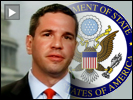 Fmr.
Marine, State Dept. Official Matthew Hoh Is First US Official to Resign over
Afghan War Hoh July 01, 2010
Fmr.
Marine, State Dept. Official Matthew Hoh Is First US Official to Resign over
Afghan War Hoh July 01, 2010
Last September, Matthew Hoh became the first US official known to resign in
protest over the Afghan war. At the time of resignation, he was serving as the
senior US civilian in Zabul province on the Pakistani border. In his resignation
letter, Hoh wrote, "I have lost understanding of and confidence in the strategic
purposes of the United States’ presence in Afghanistan. I have doubts and
reservations about our current strategy and planned future strategy, but my
resignation is based not upon how we are pursuing this war, but why and to what
end."
 3
US Soldiers Speak Out on McChrystal’s Firing, Petraeus as Replacement, and the
Unending War in Afghanistan June 24, 2010
3
US Soldiers Speak Out on McChrystal’s Firing, Petraeus as Replacement, and the
Unending War in Afghanistan June 24, 2010
President Obama says the Afghan war will continue as planned despite his firing of General Stanley McChrystal over disparaging comments made by McChrystal and his aides about top US officials. Obama has named General David Petraeus, head of the US Central Command and architect of the surge in Iraq, as a successor. The firing of McChrystal comes at a perilous moment in the Afghan war, with June now the deadliest month for the NATO force since the 2001 invasion. We speak to three soldiers: Brock McIntosh, an Afghan war vet who has filed for conscientious objector status; Victor Agosto, who was jailed after refusing to deploy to Afghanistan after serving in Iraq; and Camilo Mejia, the first GI who served in Iraq to have publicly resisted the war.
 Obama
Considers Firing Gen. Stanley McChrystal over Public Criticism of
Administration’s Handling of Afghan War Effort June 23, 2010
Obama
Considers Firing Gen. Stanley McChrystal over Public Criticism of
Administration’s Handling of Afghan War Effort June 23, 2010
The top US commander in Afghanistan, General Stanley McChrystal, is in danger of losing his job over a magazine profile in which he criticizes several top Obama administration officials. McChrystal was summoned to Washington after Rolling Stone printed an article in which he and his aides mock Vice President Joe Biden, US ambassador to Afghanistan Karl Eikenberry, National Security Adviser General James Jones, and Special Envoy Richard Holbrooke. We speak to retired Army colonel and former US diplomat Ann Wright. In 2002, she helped open the US mission in Kabul.
US-Mineralienfunde 14.06.2010
Afghanistan hofft auf Rohstoff-Boom
Von Yassin Musharbash und Hasnain Kazim, Islamabad
Riesige Rohstoffvorkommen liegen in Afghanistan: Die USA melden den Fund neuer Vorräte, die angeblich eine Billion Dollar wert sind. Doch das Land tut sich schwer, seine Schätze zu heben - ein Poker mit korrupten Politikern, Kriegsfürsten und ausländischen Konzernen hat begonnen.
U.S. Identifies Vast Mineral Riches in Afghanistan June 13, 2010
WASHINGTON — The United States has discovered nearly $1 trillion in untapped mineral deposits in Afghanistan, far beyond any previously known reserves and enough to fundamentally alter the Afghan economy and perhaps the Afghan war itself, according to senior American government officials.
 »Das ist
Aufstandsbekämpfung wie im 19. Jahrhundert« 05.06.2010
»Das ist
Aufstandsbekämpfung wie im 19. Jahrhundert« 05.06.2010
Kabul, 2. Juni: Afghanische Polizei transportiert die Leichen
zweier erschossener Attentäter ab
Foto: AP
Gespräch mit Marc Thörner. Über die neue deutsche Militärdoktrin in Afghanistan, die Informationspolitik des Verteidigungsministeriums und die Wiederkehr kolonialer Kriegsführung
Interview: Thomas Wagner
Marc Thörner (geb. 1964) lebt in Hamburg und hat Geschichte sowie Islamwissenschaften studiert. Er berichtet seit 1994 als freier Journalist überwiegend für ARD-Rundfunkanstalten aus dem Maghreb, den Golfstaaten, dem Irak, Pakistan und Afghanistan. 2009 erhielt er den Otto-Brenner-Preis für kritischen Journalismus.
Krach um Kriegsgründe 28.05.2010
Von Peter Preiß
Die Kriegsparteien im Bundestag sind sauer auf Bundespräsident Horst Köhler (CDU). Nicht, weil das Staatsoberhaupt die deutschen Soldaten in Afghanistan dreist anlügt (»Ihre Landsleute stehen Ihrem Einsatz alles andere als gleichgültig gegenüber. Sie haben Rückhalt und Unterstützung.«), sondern weil er der hiesigen Öffentlichkeit die Wahrheit über die eigentlichen Kriegsgründe näherbringt. Die Bundeswehr ist demnach am Hindukusch zur Durchsetzung wirtschaftlicher Interessen und der Sicherung von Handelswegen. SPD und Grüne, die die Bundeswehr vor gut acht Jahren in den Krieg um Brunnen, Mädchenschulen und Demokratie in Afghanistan geschickt haben, sind außer sich. ...
Desaster in Kabul
19.05.2010
Schwerster Anschlag in der afghanischen Hauptstadt seit einem Jahr. Deutsche Friedensforscher kritisieren Strategie der Bundesregierung.
Von Arnold Schölzel
 Die NATO in Afghanistan: Weltkrieg in einem Land 18.05.2010
Die NATO in Afghanistan: Weltkrieg in einem Land 18.05.2010
Lady Liberty
Von
Rick Rozoff –
Stop NATO
Übersetzt von Wolfgang Jung
Der NATO-Kritiker Rick Rozoff behauptet, Afghanistan sei Truppenübungsplatz und Experimentierfeld für künftige Angriffskriege der USA und der NATO - auch in anderen Weltge - genden.
Seit die North Atlantic Treaty Organization / NATO im Jahr 2003 den Befehl über die International Security Assistance Force / ISAF in Afghanistan übernommen hat, ist die Anzahl der Soldaten unter diesem Kommando von 5.000 auf über 100.000 angestiegen. ...
Five US Troops Killed as Convoy Attacked in Afghanistan May 18, 2010
12 Civilians, One Other NATO Soldier Also Slain in Bombing
by Jason Ditz
McChrystal Terms Afghan War ‘A Draw’ May 13, 2010
Growing Doubts Over Kandahar Offensive
by Jason Ditz
NATO’s Afghan Civilian Killings More than Doubled in Early 2010 April 16, 2010
Is This the "Progress" President Obama Spoke Of?
Guttenberg rüstet Bundeswehr in Afghanistan auf April 14, 2010 (Spiegle Online)
Afghan president, Hamid Karzai, threatens to block Nato offensive April 11, 2010
The president of Afghanistan, Hamid Karzai, has cast doubt over Nato’s planned summer offensive against the Taliban in the southern province of Kandahar, as more than 10,000 American troops pour in for the fight. ...
Taliban-Angriff auf die Bundeswehr 02.04.2010
Blutiger Karfreitag in Camp Kunduz
Drei Tote, mehrere Verletzte, die Truppe in Aufruhr: Eine konzertierte Aktion der Taliban hat die deutschen Einsatzkräfte in Afghanistan hart getroffen. SPIEGEL-ONLINE-Reporter Hasnain Kazim erlebte einen der schlimmsten Tage der Bundeswehr in Camp Kunduz und schildert die dramatischen Stunden.
CIA macht Stimmung 03.04.2010
Von Rainer Rupp
Ein der Enthüllungswebseite WikiLeaks zugespieltes Memorandum der CIA beschreibt, wie die Fortführung des Krieges in Afghanistan der Bevölkerung in Deutschland und Frankreich schmackhaft gemacht werden kann. Seit die Koalitionsregierung in den Niederlanden wegen des Streites über eine weitere Truppenstationierung am Hindukusch auseinandergebrochen ist, macht man sich in der CIA offensichtlich große Sorgen, daß sich das insbesondere auch in Deutschland und Frankreich wiederholen könnte. Die beiden Länder stellen nach den USA und Großbritannien die meisten Truppen in Afghanistan. Das am 11.März dieses Jahres von der »Red Cell« der CIA verfaßte »Sondermemorandum« trägt den Titel »Afghanistan: Die Erhaltung der westeuropäischen Unterstützung für die NATO-geführte Mission – warum es nicht ausreicht, auf Apathie zu setzen« (file.wikileaks.org/file/cia-afghanistan.pdf). Das Memorandum ist »vertraulich« und »nicht für Ausländer bestimmt«. ...
Siehe auch: http://luftpost-kl.de/luftpost-archiv/LP_10/LP08710_310310.pdf (eine Übersetzung der in WikiLeaks veröffentlichten Teile des Memorandums)
CIA paper reveals plans to manipulate European opinion on Afghanistan March 26th, 2010
By Daniel Tencer
'Out-of-the-box' CIA think tank proposes concerns over women's rights, fear of terrorism as ways to boost support for Afghan war
Evidently spooked by the collapse of the Dutch government over the country's involvement in Afghanistan, the CIA has put together a strategy proposal to prevent what it fears could be a "precipitous" collapse of support for the war in Afghanistan among European allies.
A document marked "confidential / not for foreign eyes," posted to the Wikileaks Web site, suggests strategies to manipulate European public opinion on the war, particularly in France and Germany.
The document doesn't propose any direct methods by which the CIA could achieve this -- there are no references to planting propaganda in the press, for example -- but it does lay out what it sees as the key talking points to changing hearts and minds on the war. Among its proposals, the policy paper suggests playing up the plight of Afghan women to French audiences, as the French public has shown concern for women's rights in Afghanistan.
For the German audience, the document suggests a measure of fear-mongering about the possible fallout of NATO failure in Afghanistan. "Germany's exposure to terrorism, opium, and refugees might help to make the war more salient to skeptics," the document asserts. ...
US: Iran ‘Training’ Taliban Fighters March 23, 2010
Accusation Appears Based on Weekend Claims of Taliban 'Commanders'
by Jason Ditz
US Army Lt. Col. Edward Sholtis today accused Iran of providing both “materiel” and training for “Taliban elements” in Afghanistan. Another, unnamed US official also claimed that Iran was conducting small-scale weapons training for Taliban fighters.
The allegations appear to be based at least partially on claims by two unnamed Taliban “commanders” who say that the Iranian government was paying for them to attend a three month training course in IED attacks in the Iranian city of Zahedan. (...)
Such allegations from US officials crop up from time to time, but are never given much credence, given the history of animosity between the Taliban and the Iranian government. Officials never seem to present a plausible reason for Iran’s Shi’ite government, which only barely tolerates its Sunni minority, to back a Sunni militant group which openly calls for the death of all Shi’ites as heretics.
It is entirely plausible that Taliban forces might be in Zahedan, a Sunni dominated city along the border which is teaming with militant factions who regularly attack the Iranian government and the city’s Shi’ite minority. Claims that the two are working together, however, seem to center primarily around American assumptions that every faction not on good terms with the United States must secretly be in cahoots.
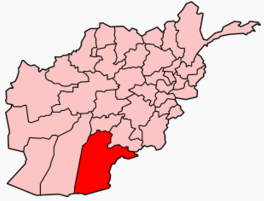 Gen. McChrystal: Kandahar Invasion Already Started March 17, 2010
Gen. McChrystal: Kandahar Invasion Already Started March 17, 2010
Predicts Months of Escalation Ahead
by Jason Ditz
Officials had previously talked of the NATO invasion of Kandahar Province as something happening in late spring or early summer. Using the Marjah offensive as a guide, a massive number of US and allied troops would invade Kandahar city and the surrounding region. ...
NATO Attacks Afghan Buses, Killing 27 Civilians February 22, 2010
Gen. McChrystal 'Deeply Saddened' as Afghan Cabinet Condemns Strike
by Jason Ditz
NATO warplanes launched an air strike against three minibuses traveling in the Uruzgan Province near Kandahar today, killing at least 27 civilians and wounding at least 12 others. The Afghan cabinet initially put the toll at 33, but revised it downward for some unknown reason. ...
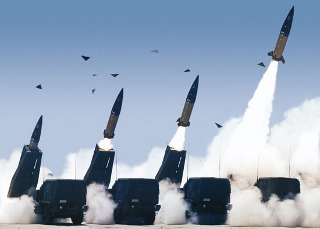 NATO Changes Story: House Full of Afghan Civilians Deliberately Hit
February 16, 2010
NATO Changes Story: House Full of Afghan Civilians Deliberately Hit
February 16, 2010
High Mobility Artillery Rocket System (HiMARS)
Three More Civilians Killed in Offensive Today
by Jason Ditz
(...) The claims led to NATO announcing that the High Mobility Artillery Rocket System (HiMARS) responsible for firing the missiles would be suspended from use pending further review.
The review didn’t take long, however, as NATO announced today that the HiMARS did not malfunction, and the missile hit the house deliberately. Officials are now suggesting that there may have been militants in or near the house, though there appears to be no evidence of that and only civilians were killed in the house’s destruction. ...
NATO Confirms Kandahar Air Strike Killed Five Civilians February 15, 2010
Civilians Were 'Mistaken for Insurgents'
by Jason Ditz
Civilian Killings by US Cast Pall on NATO’s Marjah Offensive February 14, 2010
Officials Insist Invasion of Town Going According to Plans
by Jason Ditz
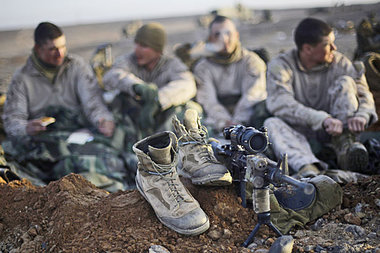 »Wir bringen Frieden«
13.02.2010
»Wir bringen Frieden«
13.02.2010
»Die Truppen kommen, um Ihnen zu helfen.« – US-Marines vor der
Stadt
Marja am Freitag Foto: AP
Von Rüdiger Göbel
NATO-Propaganda vor der Großoffensive: Besatzer verteilen Flugblätter in Helmand. Bevölkerung flieht. US-Soldaten sollen Zivilisten liquidiert haben.
In der Provinz Helmand warten Tausende NATO-Soldaten auf den Angriffsbefehl zur größten Offensive seit Beginn der Afghanistan-Invasion im Jahr 2001. Ziel der von einheimischen Hilfstruppen unterstützten Operation mit dem Codenamen »Muschtarak« (»gemeinsam«) ist die Vertreibung der Taliban aus der Region. Vor den Bombardements haben die US-Streitkräfte eine Beschwichtigungskampagne gestartet. Am Freitag verteilten die Besatzer Flugblätter mit der Warnung, die Aufständischen »nicht zu beherbergen und nicht auf eigene Grundstücke zu lassen«. Auf den in der Stadt Marja verteilten Flyern hieß es weiter: »Die Truppen kommen, um Ihnen zu helfen. Wir bringen Frieden.« (...)
Überlebende der Kommandoaktion werfen den Besatzern vor, fünf Unschuldige liquidiert zu haben. Ein Familienangehöriger der Toten schilderte AP den Vorfall telefonisch: In dem Haus waren demnach etwa 20 Menschen zusammengekommen, um die Geburt eines Sohnes zu feiern. US-Spezialkräfte umstellten das Anwesen. Ein Mann, der in den Hof hinaustrat, um nach dem Grund zu fragen, wurde niedergeschossen. Ebenso ein zweiter. Die übrigen Anwesenden wurden aus dem Haus geholt, sie mußten sich hinknien und wurden gefesselt. Der Lokalpolitiker Schahjesta Dschan Ahadi erklärte, an der Operation seien keine afghanischen Soldaten beteiligt gewesen.
Das Nachrichtenmagazin Stern berichtet in seiner aktuellen Ausgabe, die Besatzungstruppen in Afghanistan arbeiten geheime Todeslisten ab. Auf diesen sollen die Namen hoher und mittlerer Kommandeure stehen, die erst aufgespürt und dann entweder gefangen genommen (Code »c« für »capture«) oder auch getötet werden (»k« für »kill«). An solchen Aktionen ist neben amerikanischen Spezialeinheiten auch das Kommando Spezialkräfte (KSK) der Bundeswehr beteiligt.
NATO, Taliban Square Up for Fight Over Helmand Village February 07, 2010
With Weeks to Prepare, Taliban 'Digging In' to Resist Invasion
by Jason Ditz
The speculative Battle of Marjah is set to begin, with NATO and Taliban forces squaring up for a clash unprecedented both in size and telegraphing since the 2001 invasion. ...
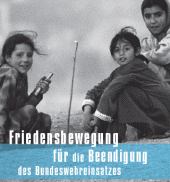 Friedensbewegung ruft zu bundesweiter Demo am 20. Februar auf 01.
Februar 2010
Friedensbewegung ruft zu bundesweiter Demo am 20. Februar auf 01.
Februar 2010 Nach der Regierungserklärung der Bundeskanzlerin zu Afghanistan am Mittwoch und der Londoner Afghanistan-Konferenz am Donnerstag sind die letzten Zweifel ausgeräumt: Der Afghanistan-Krieg wird mit unverminderter Härte weiter geführt, die Zahl der NATO-Truppen um 40.000 Soldaten erhöht, ...
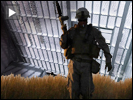 “America’s
Secret Afghan Prisons”: Investigation Unearths New US
Torture Site, Abuse Allegations in Afghanistan
February 2, 2010
“America’s
Secret Afghan Prisons”: Investigation Unearths New US
Torture Site, Abuse Allegations in Afghanistan
February 2, 2010A new investigation by journalist Anand Gopal reveals harrowing details about US secret prisons in Afghanistan, under both the Bush and Obama administrations. Gopal interviewed Afghans who were detained and abused at several disclosed and undisclosed sites at US and Afghan military bases across the country. He also reveals the existence of another secret prison on Bagram Air Base that even the Red Cross does not have access to. It is dubbed the Black Jail and is reportedly run by US Special Forces.
US Drone Fired Missile Into a ‘Crowd of Suspects,’ Killing 13 Afghans January 13, 2010
by Jason Ditz
Three Others Killed in Smaller Drone Strike
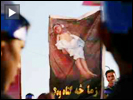 US-Led
Forces Accused of Executing Schoolchildren in Afghanistan
January 6, 2010
US-Led
Forces Accused of Executing Schoolchildren in Afghanistan
January 6, 2010
In Afghanistan, hundreds have taken to the streets of Kabul and elsewhere to protest the US killing of civilians. The incident that has sparked the most outrage took place in eastern Kunar on December 27th, when ten Afghans, eight of them schoolchildren, were killed. According to the Times of London, US-led troops dragged innocent children from their beds and shot them during a nighttime raid. Afghan government investigators said the eight students were aged from eleven to seventeen, all but one of them from the same family
8 US CIA Agents, 5 Canadians Killed in Afghanistan December 30, 2009
Forward Operating Base "Gym" Actually a CIA Surveillance Center
by Jason Ditz
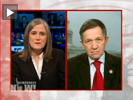 Rep.
Kucinich on Afghanistan War: “We’re Acting Like a Latter Day Version of the
Roman Empire” December 2, 2009
Rep.
Kucinich on Afghanistan War: “We’re Acting Like a Latter Day Version of the
Roman Empire” December 2, 2009
As President Obama unveils his plan to escalate the war in Afghanistan, we speak with Ohio Congressmember Dennis Kucinich. “The United States is going deeper and deeper into debt,” says Kucinich. “We have money for Wall Street and money for war but we don’t have money for work…for healthcare. We have to start asking ourselves, ‘Why is it that war is a priority but the basic needs of people in this country are not?’”
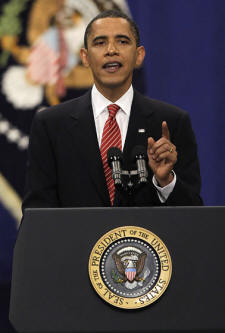 Moralische Aufrüstung
03.12.2009
Moralische Aufrüstung
03.12.2009
Auf dem Spiel steht nicht weniger als »die gemeinsame Sicherheit
der Welt« – US-Präsident
Barack Obama am Dienstag abend in der Militärakademie West Point
Foto: AP
US-Präsident Obama ordnet militärische Eskalation in Afghanistan an. Zeitung berichtet: Mehr CIA-Agenten sollen nach Pakistan geschickt werden
Von Knut Mellenthin
Zum zweiten Mal in diesem Jahr hat Barack Obama am Dienstag abend (Ortszeit) eine »umfassende neue Strategie für Afghanistan und Pakistan« präsentiert. Dem selben Thema hatte der US-Präsident sich schon am 27. März ausführlich gewidmet. Nennenswerte Unterschiede zwischen beiden Reden gibt es nicht. Damals hatte Obama die Entsendung von 21000 zusätzlichen Soldaten nach Afghanistan angekündigt. Jetzt teilte er mit, daß er weitere 30000 nachschieben will. Als Obama im Januar das Amt von George W. Bush übernommen hatte, waren erst 32000 US-Amerikaner in Afghanistan stationiert. ...
US Looks to Bypass Karzai in Running Afghanistan November 30, 2009
Holbrooke Advocates 'High Representative' Initiative
by Jason Ditz,
In a move being forwarded primarily by US special envoy Richard Holbrooke, the United States is seeking to have an international “high representative” appointed to control day-to-day operations of the Afghan government.
 'Liberation was just a big lie'
Nov 19. 2009
'Liberation was just a big lie'
Nov 19. 2009
Malalai Joya
Outspoken Afghan MP says Canadian mission is a big waste of time
She sleeps in safe houses, with a rotating squad of bodyguards securing the doors. She goes out only in a billowing burqa. Even her wedding was held in secret. Elected the youngest member of the Afghan parliament – and suspended for her outspoken criticism of the country's top officials – Malalai Joya has been labelled the bravest woman in Afghanistan. ...
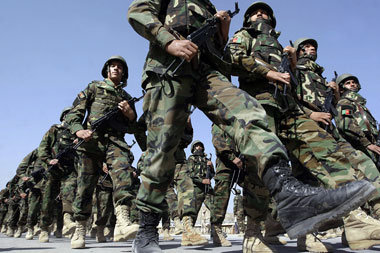 Gewalt
in Permanenz 23.10.2009
Gewalt
in Permanenz 23.10.2009
Bis 2015 sollen afghanische Kräfte in der Lage sein, den
Großteil der Kampfhandlungen allein
zu schultern (Angehörige der Afghanischen Nationalarmee bei einer
Truppenzeremonie in Kabul, 18.8.2008)
Die EU und die »Afghanisierung« des Krieges
Von Sabine Lösing und Jürgen Wagner
Offensichtlich liebäugelt die SPD nach ihrem Wahldebakel für den nächsten Urnengang mit einem rot-rot-grünen Bündnis, weshalb sie nun der Linkspartei umso deutlicher ins Stammbuch schreibt, sie müsse hierfür jedoch erst »politikfähiger« werden. ...
Taliban Widen Afghan Attacks From Base in Pakistan September 23, 2009 (NYT)
By ERIC SCHMITT and MARK MAZZETTI
WASHINGTON — Senior Taliban leaders, showing a surprising level of sophistication and organization, are using their sanctuary in Pakistan to stoke a widening campaign of violence in northern and western Afghanistan, senior American military and intelligence officials say. ...
Interview mit dem Pakistans Ex-Geheimdienstchef Asad M. Durrani 16.09.2009
„Die Taliban führen unseren Krieg“
Von Jürgen Rose
Brückenkopf Afghanistan 11.09.2009
Hintergrund. Über das Land am Hindukusch versucht die deutsche Herrschaftsriege seit über 100 Jahren, Einfluß in Zentralasien zu erlangen
Von Michael Roeder
Michael Roeder ist promovierter Historiker und Pädagoge und lebt in Berlin
Deutsche Botschafter baten um Ende der Kritik 11. September 2009
Die Bundesregierung hat offenbar auf diplomatischem Weg versucht, die internationale Kritik an dem Luftangriff in Afghanistan einzudämmen. Einem Bericht zufolge baten die deutschen Botschafter in allen wichtigen Partnerländern darum, den Angriff vor Ende der offiziellen Untersuchung nicht mehr zu kritisieren.
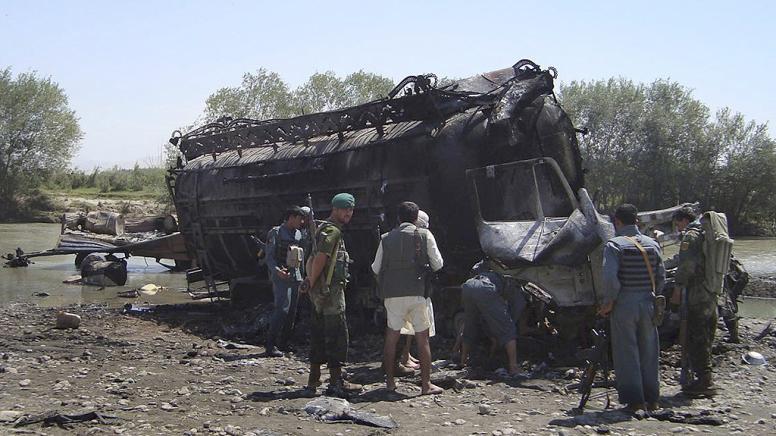 Jung wehrt
sich gegen Kritik 06.09.2009 (tagesschau.de)
Jung wehrt
sich gegen Kritik 06.09.2009 (tagesschau.de)
Bundesverteidigungsminister Franz-Josef Jung hat Kritik an dem von der Bundeswehr angeforderten Luftschlag im afghanischen Kundus zurückgewiesen. Der Angriff auf die Taliban-Kämpfer sei dringend geboten gewesen, um einen Anschlag auf den Bundeswehr-Stützpunkt in Kundus zu verhindern, so Jung zur "Bild am Sonntag". ...
Hintergrund: Zivilisten als Kollateralschäden 06.09.2009
Hamburg (dpa) - Bei kriegerischen Auseinandersetzungen genießen Zivilisten theoretisch einen besonderen Schutz. Nach den Genfer Konventionen und ihren Zusatzprotokollen müssen sie geschont und nach den Grundsätzen der Menschlichkeit behandelt werden.
Angriffe auf unbeteiligte Bürger sind nur unter bestimmten Umständen erlaubt - wenn dadurch zum Beispiel eine Katastrophe mit weit mehr Toten verhindert werden kann. Die Realität sieht oft anders aus: Kriegerische Konflikte ohne zivile Opfer gibt es nicht.
Der Begriff Kollateralschaden ist seit dem Kosovokrieg 1999 bekannt. Damals erklärte NATO-Sprecher Jamie Shea, warum angebliche Präzisionsgeschosse wieder einmal daneben getroffen hatten. Mit Blick auf die getöteten Zivilisten sorgte der trockene Ausdruck für Empörung, Sprachwissenschaftler wählten ihn zum deutschen Unwort des Jahres. ...
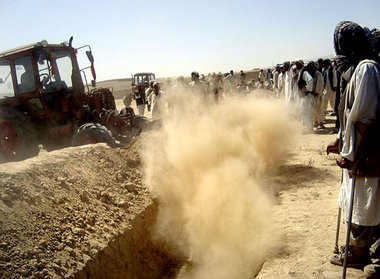 Massaker
bei Kundus 05.09.2009
Massaker
bei Kundus 05.09.2009
Beisetzung im Massengrab – Afghanen beerdigten am Freitag
ihre beim NATO-Angriff
getöteten Angehörigen Foto: AP
Bei einem NATO-Angriff im Norden Afghanistans sind am Freitag bis zu 90 Menschen getötet worden. Dutzende weitere wurden verletzt, viele von ihnen schwer. Verantwortlich für das Blutbad bei Kundus ist die Bundeswehr, die zwei entführte Tanklastfahrzeuge von US-Kampfflugzeugen bombardieren ließ. (...)
Manfred Stenner vom Bonner Netzwerk Friedenskooperative erklärte dagegen: »Sollten sich die bisher spärlichen Informationen über die Kämpfe nach der Entführung der Tanklastzüge in der Nähe von Kundus bestätigen, hat die Bundeswehr ein Massaker zu verantworten.«
![]()
Bundeswehr wollte mit Luftangriff
Selbstmordattentat verhindern ("The devil can cite Scripture for his
purpose." - William Shakespeare (The Merchant of Venice))
Die in Afghanistan von Taliban gekaperten Tanklaster sollten der Bundesregierung zufolge für ein Selbstmordattentat eingesetzt werden. Deswegen habe die Bundeswehr Luftunterstützung angefordert, sagte Verteidigungsstaatssekretär Kossendey. Die Nato hat eine Untersuchung eingeleitet.
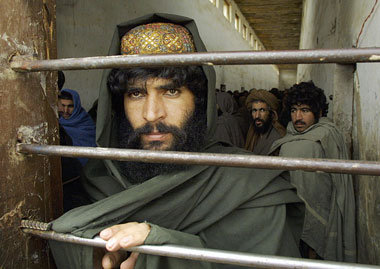 Dabeisein um jeden Preis
26.08.2009
Dabeisein um jeden Preis
26.08.2009
Folter als Bestrafung – in
US-geführten Haftanstalten in Afghanistan
gängige Praxis (Gefängnis von Shibarghan, 19.1.2002) Foto: AP
Hintergrund: Die Folterlager Afghanistans (Teil II und Schluß) (Teil 1)
Alexander Bahar
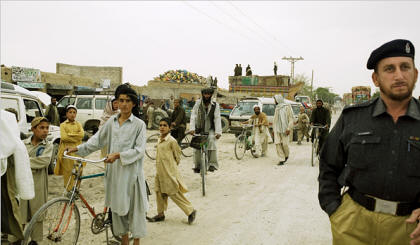 Taliban
Haven in Pakistani City Raises Fears February 9, 2009
(NYT)
Taliban
Haven in Pakistani City Raises Fears February 9, 2009
(NYT)
A street in Kushlak, Pakistan, near Quetta. United
States officials say Taliban
leaders have been stirring violence in Afghanistan from havens in the Quetta
area.
By ERIC SCHMITT and MARK MAZZETTI
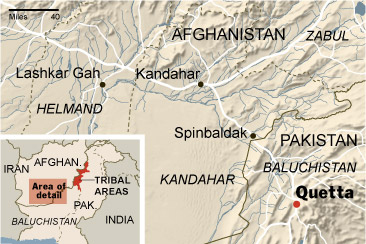 WASHINGTON - Even as
C.I.A. drone aircraft pound
Al Qaeda in
Pakistan’s tribal region, there is growing concern among American military
and intelligence officials about different militants’ havens in Pakistan that
they fear could thwart American military efforts in
Afghanistan this year.
WASHINGTON - Even as
C.I.A. drone aircraft pound
Al Qaeda in
Pakistan’s tribal region, there is growing concern among American military
and intelligence officials about different militants’ havens in Pakistan that
they fear could thwart American military efforts in
Afghanistan this year.
American officials are increasingly focusing on the Pakistani city of Quetta, where Taliban leaders are believed to play a significant role in stirring violence in southern Afghanistan. ...
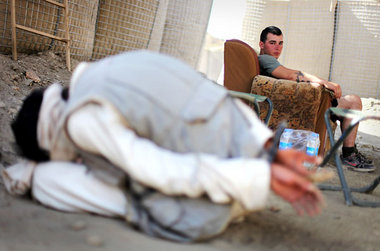 Schlimmer als Guantánamo
25.08.2009
Schlimmer als Guantánamo
25.08.2009 Lange Zeit hatte sich die internationale Aufmerksamkeit vor allem auf die Mißhandlung und Folterung von Gefangenen auf der US-Marinebasis in Guantánamo Bay, Kuba, sowie im Gefängnis von Abu Ghraib im Irak konzentriert. Nachdem infolge der Wahl Barack Obamas zum US-Präsidenten immer mehr Details über Kriegsverbrechen der USA im Zuge des »Antiterror«-Krieges in Afghanistan bekannt geworden waren, präsentierte die New York Times am 11. Juli in großer Aufmachung neue Enthüllungen über ein Massaker an etwa 2000 Taliban-Kriegsgefangenen in Dascht-i-Leili im Norden Afghanistans. Dem Bericht zufolge hatte die frühere US-Regierung unter George W. Bush alles unternommen, um den Massenmord zu vertuschen. ...
 Eight
Years After Orchestrating Massacre at Dasht-e-Leili, Afghan Warlord
August 18, 2009
Eight
Years After Orchestrating Massacre at Dasht-e-Leili, Afghan Warlord
August 18, 2009
Angesichts steigender Verluste auf beiden Seiten und vor allem in der Bevölkerung hat NATO-Generalsekretär Anders Fogh Rasmussen am Wochenende die Entschlossenheit der westlichen Kriegsallianz bekräftigt, um jeden Preis und auf unabsehbare Zeit in Afghanistan zu bleiben. Die Niederschlagung der Aufstandsbewegung sei »von entscheidender Bedeutung für die Sicherheit« aller 42 Staaten, die dort militärisch präsent sind. ...
How did a suicide bomber get to Kabul's NATO headquarters? August 15, 2009
By Jonathan S. Landay | McClatchy Newspapers
KABUL, Afghanistan — Afghan authorities are trying to determine how a suicide bomber breached tight security in Kabul's diplomatic quarter on Saturday and detonated an SUV packed with explosives in front of NATO headquarters five days before the presidential election. ...
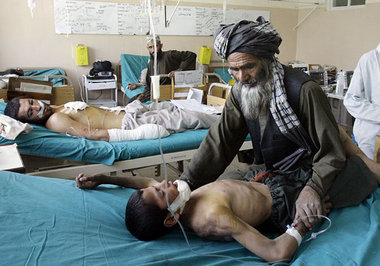 Vom Konflikt zum Krieg
31.07.2009
Vom Konflikt zum Krieg
31.07.2009
Zivile Opfer einkalkuliert: Versorgung verletzter Dorfbewohner
nach einem
Angriff von Regierungstruppen in der Provinz Kandahar (16.6.2009) Foto: AP
Wir dokumentieren im folgenden eine Analyse von Jürgen Heiducoff, Oberstleutnant der Bundeswehr, die sich mit der aktuellen Situation in Afghanistan befaßt. Heiducoff war nach Angaben der ARD-Sendung Monitor vom 31.7.2007 Militärpolitischer Berater an der Botschaft der Bundesrepublik Deutschland in Kabul.
Den aktualisierten Text entnahmen wir der Website des Arbeitskreises Darmstädter Signal (»Das kritische Forum für Staatsbürger in Uniform«, www.darmstaedter-signal.de), die Zwischenüberschriften wurden von der Redaktion eingefügt. (jW) ...
July in Afghanistan: A Month of Worsts July 31, 2009
UN Revelation About Rising Civilian Toll Just the Latest Bad News
by Jason Ditz
The bodies of the soldiers, who were killed in a single 24-hour period, passed through the town in Wiltshire, which is near RAF Lyneham. ...
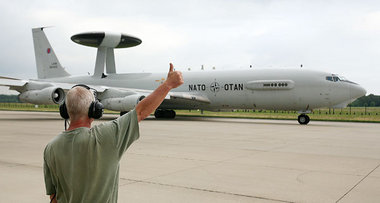 Fliegende Feuerleitstelle
01.07.2009
Fliegende Feuerleitstelle
01.07.2009
»Zivilisten zuerst« 27.06.2009
Neue US-Strategie für Afghanistan soll angeblich Zivilisten schonen. In Pakistan läßt Obama Kinder töten
Von Knut Mellenthin
 Pakistani
Opposition Politician Imran Khan on US Drone Attacks, the "Massive Human
Catastrophe"
Pakistani
Opposition Politician Imran Khan on US Drone Attacks, the "Massive Human
Catastrophe" At least sixty people have reportedly died in the South Waziristan region of western Pakistan after a US drone attack Tuesday. The attack came as the Pakistani army and air force expanded their military operations from Swat into South Waziristan. We speak with Pakistani opposition figure and cricketing legend Imran Khan, the leader of the political party known as the Movement for Justice. Khan has been an outspoken critic of both US drone attacks as well as the Pakistani military’s offensive against the Taliban.
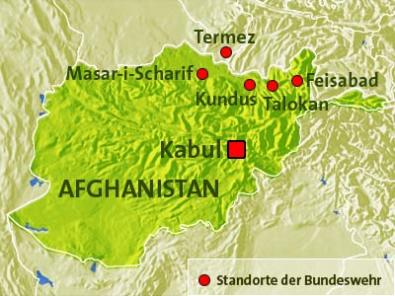 Drei deutsche
Soldaten umgekommen 23.06.2009
Drei deutsche
Soldaten umgekommen 23.06.2009

Helping Afghan Refugees as US Bombs Continue to Fall June 19, 2009
The picture to the right is of Lory and
Lindsay, cheerleaders of the
Miami Dolphins, signing bombs heading
for Afghanistan, aboard the USS Theodore Roosevelt carrier. (Pretty,
but no brains!)
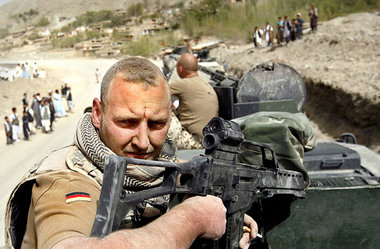 Jung muß aufrüsten
19.06.2009
Jung muß aufrüsten
19.06.2009
Von Sicherheit keine Spur – Bundeswehrsoldaten in Feisabad
Foto: AP
Von Knut Mellenthin
Das deutsche Militärkontingent in Afghanistan soll wegen der »massiv verschlechterten Sicherheitslage« zusätzliche Schützenpanzer und gepanzerte Transportfahrzeuge erhalten. (...)
Die AWACS-Maschinen sollen angeblich das fehlende Radarsystem am Boden ersetzen und für die »Flugsicherung« sorgen. Zur aufklärenden Unterstützung von Luftangriffen sei die AWACS überhaupt nicht geeignet, so das Verteidigungsministerium. Das Handelsblatt schreibt dagegen, die Flugzeuge könnten »theoretisch auch Kampfeinsätze dirigieren«. Der verteidigungspolitische Sprecher der Fraktion Die Linke im Bundestag, Paul Schäfer, weist darüber hinaus darauf hin, daß mit Hilfe der AWACS-Informationen auch US-amerikanische Drohnenangriffe gegen Pakistan erleichtert werden könnten.
Who Are the Real Psychopaths in Afghanistan? May 11, 2009
The U.S. has killed twice as many Afghan civilians as the Taliban this year and that number is sure to rise.
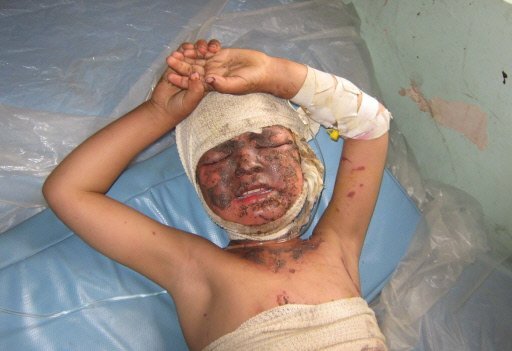
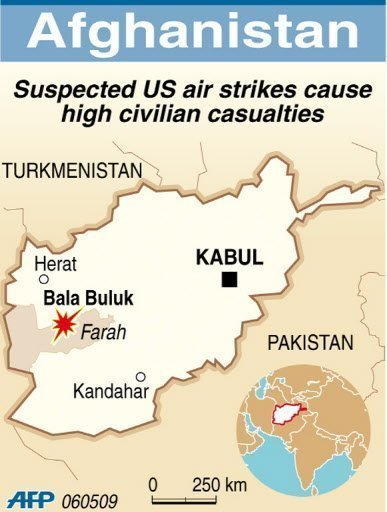
An injured child is treated in the provincial capital
Farah
US Strikes in Afghanistan Kill 100, Mostly Civilians May 06, 2009
Red Cross Confirms "Dozens" of Dead Civilians
by Jason Ditz,
US Strike Kills Dozens of Afghan Civilians May 05, 2009
District Official Claims "More Than 100" Civilians Slain in Attack
... It seems likely now that the final civilian toll will at least be the highest so far in 2009, though it remains to be seen if it will ultimately rival August 2008’s US airstrike on Herat, which killed at least 90 civilians. Afghan President Hamid Karzai has repeatedly demanded explanations for the killings, but the official US policy is to apologize, insist that “mistakes happen,” and move on to the next incident.
Pakistani army flattening villages as it battles Taliban May 4, 2009
CHINGLAI, Pakistan — The Pakistani army's assault against Islamic militants in Buner, in northwest Pakistan, is flattening villages, killing civilians and sending thousands of farmers and villagers fleeing from their homes ...
Deutscher Soldat in Afghanistan getötet 29.04.2009
Von Markus Feldenkirchen, Matthias Gebauer und Shoib Najafizada
Neuer Angriff auf die Bundeswehr in Afghanistan: In der Nähe von Kunduz ist
bei einer Attacke auf eine Patrouille ein deutscher Soldat getötet worden. Vier
Soldaten wurden verletzt. Es ist bereits der zweite Anschlag während des Besuchs
von Außenminister Steinmeier am Hindukusch.
... Bemerkenswert an dem Anschlag und der Propagandaaktion war aber das Timing der Taliban. So teilte der Sprecher mit, der Anschlag stehe im direkten Zusammenhang mit Steinmeiers Besuch. "Wir wussten von der Visite", so der Sprecher, "und der Anschlag ist ein Zeichen für den deutschen Außenminister". ...
 Fabriziertes Vertrauen
04.04.2009
Fabriziertes Vertrauen
04.04.2009
Auch die Bundeswehr vergibt bei Bedarf Filmaufträge an freie
Journalisten
(Pressetermin mit deutschem ISAF-Soldaten in Nordafghanistan, 1.7.2008)
Foto: DPA
Mit selbstproduzierten TV-Bildern versucht die NATO, die öffentliche Meinung zum Afghanistan-Krieg zu beeinflussen. Das Fernsehen der Bundeswehr ist noch im Versuchsstadium
Von Thomas Wagner
Vertreter der NATO-Mitgliedstaaten feiern auf ihrem Gipfeltreffen am 3./4. April in Baden-Baden und Strasbourg den 60. Geburtstag des westlichen Militärbündnisses. Neben unabhängigen Reportern aus aller Herren Länder werden bei diesem Anlaß auch Fernsehjournalisten zugegen sein, die ganz offiziell im Sold des Militärbündnisses stehen. Denn seit einem Jahr verfügen die NATO-Staaten über einen gemeinsamen Fernsehkanal: den Internetsender NATOchannel.tv. Über die Stoßrichtung des ausgestrahlten Programms besteht kein Zweifel. Mit Hilfe von selbstproduzierten Fernsehbildern versuchen die Militärs, das öffentliche Bild der von der NATO geführten Kriege in die außenpolitisch und militärstrategisch gewünschte Richtung zu lenken. ...
 Noam
Chomsky on US Expansion of Afghan Occupation, the Uses of NATO, and What Obama
Should Do in Israel-Palestine April 03, 2009
Noam
Chomsky on US Expansion of Afghan Occupation, the Uses of NATO, and What Obama
Should Do in Israel-Palestine April 03, 2009
We speak to Noam Chomsky, prolific author and Institute Professor Emeritus at the Massachusetts Institute of Technology. As NATO leaders gather for a sixtieth anniversary summit in France, Chomsky says, “The obvious question is, why bother celebrating NATO at all? In fact, why does it exist?” Chomsky also analyzes the Obama administration’s escalation of the Afghanistan occupation and reacts to the new Netanyahu government in Israel.
(...) AMY GOODMAN: Noam Chomsky, I want to get to Afghanistan. It’s the main topic of NATO. It’s a debate around the issue of the expansion of war in Afghanistan. President Obama’s initiative is not the main topic of debate in the United States, meaning whether or not we should be doing this. What do you think?
NOAM CHOMSKY: Well, it’s interesting. It is the topic of discussion in the United States right in the middle of the establishment. So, Foreign Affairs, the main establishment journal, had an interesting article probably six months ago, or roughly, by two of the leading specialists on Afghanistan: Barnett Rubin and Ahmed Rashid. And their basic point was that the United States should give up the idea that military victory is the answer to everything.
They said that the United States should reorient its policy so that there would be a regional solution in which the interested—the concerned countries, that includes, crucially, Iran, but also India, Russia, China, would themselves work out a regional settlement and that the Afghans should work something out among themselves. He pointed—they pointed out, correctly, that the regional countries are not happy about having a NATO military center based in Afghanistan. It’s obviously a threat to them. Now, this past—this is not what’s being done. There’s some gestures towards, you know, maybe some under secretary will say hello to an Iranian representative or something, but that’s not the core of the policy that’s being pursued.
Now that—side-by-side with that is something else that’s been happening. There is a significant peace movement in Afghanistan. Exactly its scale, we don’t know. But it’s enough so that Pamela Constable of the Washington Post, in a recent article in Afghanistan, argued that when the new American troops come, they’re going to face two enemies: the Taliban and public opinion, meaning the peace movement, whose slogan is “Put down the weapons. And we don’t mind if you’re here, but for aid and development. We don’t want any more fighting.”
In fact, we know from Western-run polls that about 75 percent of Afghans are in favor of negotiations among Afghans. Now, that includes the Taliban, who are Afghans. In fact, it even includes the ones in Pakistan. There’s the difference—the really troubled areas, now, are Pashtun areas, which are split by a British-imposed line, artificial line, called the Durand Line, which was imposed by the British to protect British India, expand it, and they’ve never accepted it. It just cuts their territory in half. Afghanistan, when it was a functioning state, never accepted it, right through the 1970s. But certainly, the Afghan Taliban are Afghans. And President Karzai, formerly our man, no longer, because he’s getting out of control—
AMY GOODMAN: How? How is he getting out of control?
NOAM CHOMSKY: Well, in interesting ways. When President Obama was elected, Afghan President Karzai sent him a message, which, as far as I know, was unanswered, in which he pleaded with President Obama to stop killing Afghans. He also addressed a UN delegation and told them he wanted a timetable for the removal of foreign forces. Well, his popularity quickly plummeted. He used to be very much praised for his nice clothes and great demeanor and very much admired by the media and commentators. Now he’s sunk very low. He’s suddenly corrupt and so on.
AMY GOODMAN: You mean in the Western world, the Western press?
NOAM CHOMSKY: In the Western world, primarily in the United States, but in the West altogether. And it directly followed these expressions of opinion, which are very likely those of maybe a majority of Afghans, maybe even more.
In fact, he went even further. He said that he would invite Mullah Omar, the head of the Taliban, to Afghanistan to try to work out a solution. And he added, “The United States isn’t going to like this, but they have two choices: they can either accept it, or they can throw me out,” you know. In fact, that’s what they’re doing. There are now plans to replace President Karzai, to sort of push him upstairs and leave him in a—it’s assumed that he’ll win the next election, so put him in a symbolic position and impose, basically, a US-appointed surrogate who will essentially run the country, because that can’t be tolerated.
In any event, there are alternative proposals—they’re discussed here, they’re widely discussed in Afghanistan at the highest level and apparently among the population—to just move towards a peaceful settlement among Afghans and a regional settlement, which would take into consideration the concerns of the region’s neighboring powers.
AMY GOODMAN: Why do you think Obama is expanding this war? And do you call it “Obama’s war” now?
NOAM CHOMSKY: Well, this goes way back. I mean, the United States has sort of a comparative advantage in world affairs, namely, military might, not economic power, you know, not Treasury reserves. I mean, it’s a very powerful state, but, you know, it’s one of several. It’s comparable to Europe. It’s comparable to rising East Asia in, say, economic power. But in military power, it is supreme. The United States spends approximately as much as the rest of the world in military force. It’s far more technologically advanced. And when you have a comparative advantage, you tend to use it. So, policy decisions tend to drift towards where you’re strong. And where you’re strong is military force. It’s, you know, the old joke: if you have a hammer, everything you see is a nail. You know. And I think that’s very much of a driving force.
And there’s also a longstanding imperial mentality, which says we have to control and dominate. And in particular, we have to dominate energy resources. That goes way back. You know, after the Second World War, it’s been maybe the prime factor in US [inaudible]—
AMY GOODMAN: And the energy resources in Afghanistan?
NOAM CHOMSKY: No, they’re not in Afghanistan. They’re in—mostly in the Gulf, secondarily in Central Asia. But Afghanistan is right in the middle of this system. I mean, there is a pipeline question. How powerful it is, you can speculate. But there have been longstanding plans for a pipeline from Turkmenistan in Central Asia to India, which would go—TAPI, it’s called: Turkmenistan, Afghanistan, Pakistan, India.
Now, that’s of significance to the United States for a number of reasons. For one thing, if it—it would run right through Afghanistan and through Kandahar province, one of the most conflicted areas. If it was established, it would, for one thing, reduce the reliance of the Central Asian states on Russia. So it would weaken their role. But more significant, it would bypass Iran. I mean, India needs energy, and the natural source is Iran. And, in fact, they’re discussing an Iran-to-India pipeline. But if you could get natural gas flowing from Central Asia to India, avoiding Iran, that would support the US policy, which is now very clear—in Obama’s case, it’s been made more concrete—of forming an alliance of regional states to oppose Iran.
In fact, that’s—John Kerry, the head of the Senate Foreign Relations Committee, recently made an important speech about that with regard to Israel-Palestine. He said we have to reconceptualize the issue so it’s not an Israel-Palestine problem, but rather, we’ll sort of put that to the side, and what we have to do is create an alliance of Israel and what are called the moderate Arab states. And “moderate” is a technical term, means they do what we say. And so, the moderate Arab states include the brutal Egyptian dictatorship, the radical fundamentalist dictatorship in Saudi Arabia, and so on. They are the moderates, and they have to join with Israel and us in an anti-Iranian alliance. And we have to, of course, break ongoing connections between Iran and India to the extent that we can and elsewhere. And that puts the Israel-Palestine problem—issue to the side. (...)
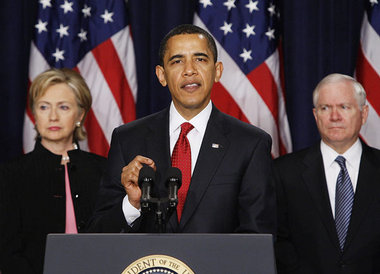 Krieg
ohne Grenzen 31.03.2009
Krieg
ohne Grenzen 31.03.2009
Durchhalteparolen: Barack Obama
verkündet, flankiert von Außenministerin
Hillary Clinton und Verteidigungsminister
Robert Gates, seine »neue Strategie«
für Afghanistan und Pakistan (27.3.2009) Foto: AP
Analyse. Obamas unlängst verkündete »neue Strategie für Afghanistan und Pakistan« knüpft fast vollständig an die Politik seines Amtsvorgängers an
Von Knut Mellenthin
Barack Obama hat am 27. März seine seit Wochen angekündigte »umfassende neue Strategie für Afghanistan und Pakistan« vorgestellt. Er selbst benutzte diese Bezeichnung schon im zweiten Satz seiner Ansprache, gleich nach dem »Good morning«. ...
 Obama's
War: US Involvement in Afghanistan, Past, Present & Future February 23, 2009
Obama's
War: US Involvement in Afghanistan, Past, Present & Future February 23, 2009
President Obama is speaking before a joint session of Congress Tuesday night in what is being described as the first State of the Union address of his presidency. While the economy is expected to dominate the agenda, Obama will also talk about his top foreign policy initiative: the war in Afghanistan. Last week, Obama ordered an additional 17,000 US combat troops to Afghanistan. The new deployments will begin in May and increase the US occupation force to 55,000. Today, we spend the hour looking at US involvement in Afghanistan with five guests: Anand Gopal, Afghanistan correspondent for the Christian Science Monitor; Paul Fitzgerald and Elizabeth Gould, authors of Invisible History: Afghanistan’s Untold Story; Gilles Dorronsoro, visiting scholar at the Carnegie Endowment for International Peace; and documentary filmmaker Kathleen Foster.
(...) ANJALI KAMAT: Paul Fitzgerald, can you talk about what happened in 1979, just before the Soviet invasion, and Zbigniew Brzezinski’s role in that?
PAUL FITZGERALD: Well, one of the big problems that I have with what Mr. Brzezinski said was the fact that he was the one who was very much instrumental in bringing back the anti-modernist element in Afghan society, which had come to terms pretty much with the Afghan government, with fifty, sixty years’ worth of Afghan governments trying to slowly modernize their society after the devastation of both Russian and British colonialism in that part of the world.
So, you know, to focus on that one area - one of the things specifically that we looked at, in terms of the documents, the documentation, which is all now available, in terms of what the Soviets were up to and in terms of what the United States was up to, the Soviets specifically tried to get a non-aligned, non-Marxist government. And they actually, before they invaded, tried to get the Marxists to step down and to hold elections and to establish a Loya Jirga, that would actually bring in a lot of the other elements. The KGB station in Kabul was not happy about the Marxists taking over. They knew full well that they did not have broad support of the people, regardless of what their political outlook was. And the Russians were telling them that, and the Russians were also telling the Carter administration exactly what their plans were and what they were going to do. In fact, Secretary of Defense, who is now the Secretary of Defense, Robert Gates, states in his book, “If ever there was something that the United States knew ahead of time was going happen, it was the Soviet involvement in Afghanistan.”
AMY GOODMAN: Wasn’t it Brzezinski himself who, when interviewed some ten years ago by the French newspaper Le Nouvel Observateur, said - and, of course, this is before 2001, the September 11th attacks - he said, “What is most important to the history of the world? The Taliban or the collapse of the Soviet empire? Some stirred-up Moslems or the liberation of Central Europe and the end of the cold war?” - talking about the US support for the Mujahideen. Paul Fitzgerald?
PAUL FITZGERALD: That’s exactly it. As I said, you know, one of the things about - we’ve been hearing a lot of very strange talk about what goes on in Afghanistan, and that’s what motivated us to go there in 1981. We were saying, “Well, we’re getting a story from the Russian side of the coin; we’re getting a story from the American side of the coin. What is going on in Afghanistan?”
When we went there, what we saw was a country that was struggling to be independent, struggling to be democratic. And the Soviet Union, for whatever their faults are, and we know they had plenty, what they were doing was they were supporting the progressive, the more progressive elements in Afghan society. The United States had been doing that in a certain period of time, during their so-called experiment in democracy during the 1960s and the 1970s. But unfortunately, after 1973, the United States turned its back on advancing the cause of Afghan democracy and started supporting the - not the Taliban, the Mujahideen movement, which was being run by the ISI in Pakistan, the intelligence arm of the Pakistani army. And this is where things began to go terribly wrong. (...)
KATHLEEN FOSTER: Yes. I think she’s talking about the ’80s, the beginning of the ’80s, and she lived through the - as an activist through the ’70s, when Afghanistan was really - had a very progressive movement. There was a big movement of communist people, various Marxists, socialists, and eventually a takeover by the communists. And women’s rights at that point were one of the major - one of the major thrusts. And women were becoming - were getting educated. They were deciding their own destiny, no more forced marriages, and so on and so forth.
And as the Mujahideen, as the US funded these - what were a very small group of fundamentalists, who were also allied with the wealthy landowners, so that it was a sort of class struggle going on in Afghanistan - as the US funded these people in the countryside, where they were most - where they were really the strongest, women started to lose their rights totally. Schools were bombed. People who had any contact with the government, like government officials, like teachers, and so on and so forth, were killed. Women were raped. And so, Fahima - and then, in ’94, the Mujahideen actually took over the country, and that’s when Fahima is saying the women’s rights throughout the whole country were lost at that point, not when the Taliban took over, which is what, you know, we usually hear in the press, that the Taliban were responsible for the women losing their rights. But it was really before that. (...)
KATHLEEN FOSTER: (...) And I think, you know, we have to look at why the US is in Afghanistan. Why have they been there for thirty years? What have they been doing? You know, $40 billion was spent on the secret war in the ’80s between the US and the Saudis, and what are they actually there for?
Brzezinski really stated it very clearly when he was National Security Adviser for Carter, and that Afghanistan is a key to US domination of Eurasia, which is the most important in terms of the US needing to dominate, keep their domination in the world. It’s the most important area for them to be controlling, because that means it’s the largest population. It’s 60 percent of the world’s wealth is in that area and, most importantly, all the oil. Seventy percent of the world’s oil is in that area in the Persian Gulf and in the Caspian Sea area to the north of Afghanistan. And Afghanistan stands in the center of that. And that’s part of the - it’s a vital part of US strategy to control Afghanistan in whatever way they can.
And I think one way, maybe - and this has been talked about in government circles here and in Pakistan - to actually balkanize that whole area, Pakistan and Afghanistan, the two have to be seen together. And maybe the point is some people are talking about a Taliban state, which would go across the border between Afghanistan and Pakistan, so that it would - the area would be easier to control, the same way that Yugoslavia was. And you can see that that’s going on in Pakistan today. ...
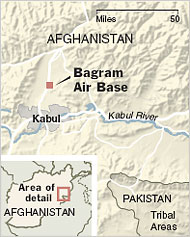 Obama
Upholds Detainee Policy in Afghanistan February 21, 2009
Obama
Upholds Detainee Policy in Afghanistan February 21, 2009
WASHINGTON — The Obama administration has told a federal judge that military detainees in Afghanistan have no legal right to challenge their imprisonment there, embracing a key argument of former President Bush’s legal team. ...
Afghanistan + More Troops = Catastrophe
See also: http://rethinkafghanistan.com and sign the petition
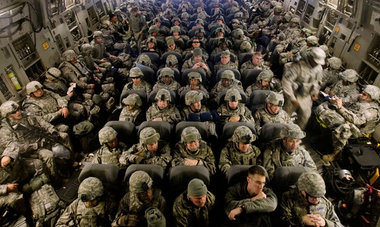 Obama setzt
auf Krieg 19.02.2009
Obama setzt
auf Krieg 19.02.2009
Ende 2008 warnte ein Taliban-Sprecher: »Mehr US-Truppen bedeutet
auch,
daß es mehr Ziele für die Taliban gibt.« Foto: AP
Neuer US-Präsident schickt weitere 17000 Soldaten nach Afghanistan. NATO soll Kontingente ebenfalls erhöhen
Von Knut Mellenthin
Siehe auch: Obama OKs 17,000 new troops for Afghanistan
Talking, rather than fighting, in Afghanistan February 15, 2009
By Amy Goodman
Angriffe im Zentrum Kabuls 12.02.2009
Mehrere Regierungsgebäude zeitgleich attackiert. Taliban bekennen sich
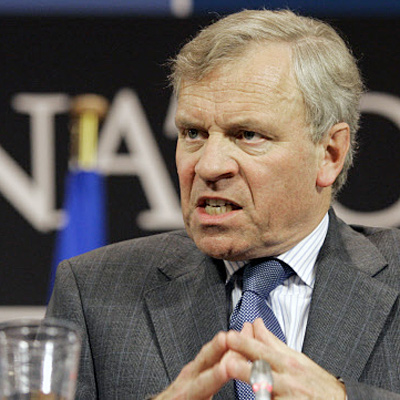 NATO Chief Slams ‘Unacceptable’ Leak of Craddock’s Position Posted
January 29, 2009
NATO Chief Slams ‘Unacceptable’ Leak of Craddock’s Position Posted
January 29, 2009
NATO Secretary-General Jaap de Hoop
Scheffer
... NATO Secretary-General Jaap de Hoop Scheffer is riled up too, but not in the way you’d figure. He’s not so much upset at the general for ordering troops which are already losing ground to the insurgency to waste their time killing random opium dealers: he’s mad at whoever leaked the report. ...
 Tötungsbefehl entsetzt deutsche Politiker 29.01.2009
Tötungsbefehl entsetzt deutsche Politiker 29.01.2009
Von Matthias Gebauer und Susanne Koelbl
Deutsche Politiker zeigen sich erschüttert über Nato-Oberbefehlshaber
Craddock, der afghanische Drogenhändler auch ohne Beweise für
Terror-Verwicklungen töten lassen will. Die Nato spielt sein Papier herunter: Es
handle sich lediglich um eine "Weisung" - das ist allerdings nicht richtig.
NATO Dramatically Underreports How Many Civilians It Has Killed January 28, 2009
Afghan Govt Threatens Referendum if NATO Doesn't Stop Killing Civilians
Top NATO Commander Orders Troops to Kill All Opium Dealers January 28, 2009
Gen. Craddock Determined to Turn War On Taliban Into War on Drugs
Russia stops US on road to Afghanistan January 27, 2009 (Asia Times Online )
By M K Bhadrakumar
... "I can responsibly say that in the event of NATO's defeat in Afghanistan, fundamentalists who are inspired by this victory will set their eyes on the north. First they will hit Tajikistan, then they will try to break into Uzbekistan ... If things turn out badly, in about 10 years, our boys will have to fight well-armed and well-organized Islamists somewhere in Kazakhstan," the popular Moscow-politician turned diplomat added.
Russian experts have let it be known that Moscow views with disquiet the US's recent overtures to Central Asian countries regarding bilateral transit treaties with them which exclude Russia. Agreements have been reached with Georgia, Azerbaijan and Kazakhstan. Moscow feels the US is pressing ahead with a new Caspian transit route which involves the dispatch of shipments via Georgia to Azerbaijan and thereon to the Kazakh harbor of Aktau and across the Uzbek territory to Amu Darya and northern Afghanistan.
Russian experts estimate that the proposed Caspian transit route could eventually become an energy transportation route in reverse direction, which would mean a strategic setback for Russia in the decade-long struggle for the region's hydrocarbon reserves. ...
Second, Medvedev made it clear Moscow would resist US attempts to expand its military and political presence in the Central Asian and Caspian regions.
Plainly put, Moscow will not allow a replay of the US's tactic after September 11, 2002, when it sought a military presence in Central Asia as a temporary measure and then coolly proceeded to put it on a long-term footing.
Karzai reaches out to Moscow
Interestingly, Medvedev's remarks coincide with reports that Washington is
cutting Afghan President Hamid Karzai adrift and is planning to install a new "dream
team" in Kabul.
Medvedev had written to Karzai offering military aid. Karzai apparently accepted
the Russian offer, ignoring the US objection that in terms of secret US-Afghan
agreements, Kabul needed Washington's prior consent for
such dealings with third countries.
A statement from the Kremlin last Monday said Russia was "ready to provide broad assistance for an independent and democratic country [Afghanistan] that lives in a peaceful atmosphere with its neighbors. Cooperation in the defense sector ... will be effective for establishing peace in the region". It makes sense for Kabul to make military procurements from Russia since the Afghan armed forces use Soviet weaponry. But Washington doesn't want a Russian "presence" in Kabul.
Quite obviously, Moscow and Kabul have challenged the
US's secret veto power over Afghanistan's external relations. Last Friday,
Russian and Afghan diplomats met in Moscow and "pledged to continue developing
Russian-Afghan cooperation in politics, trade and economics as well as in the
humanitarian sphere". Significantly, they also "noted the importance of the
Shanghai Cooperation Organization [SCO]" that is dominated by Russia and China.
SCO seeks Afghan role
Washington cannot openly censure Karzai from edging close to Russia (and China)
since Afghanistan is notionally a sovereign
country. Meanwhile, Moscow is intervening in Kabul's assertion of independence.
Moscow has stepped up its efforts to hold an international conference on
Afghanistan under the aegis of the SCO. The US doesn't want Karzai to legitimize
a SCO role in the Afghan problem. Now a flashpoint arises. ...
The big question is whether Karzai will seize these regional trends and respond to the SCO overture, which will enable Kabul to get out of Washington's stranglehold? To be sure, Washington is racing against time in bringing about a "regime change" in Kabul.
The point is, more and more countries in the region are finding it difficult
to accept the US monopoly on conflict-resolution in Afghanistan. ...
The current US thinking, on the other hand, is to strike "grand bargains" with
regional powers bilaterally and to keep them apart from collectively
coordinating with each other on the basis of shared concerns. ...
Evidently, Petraeus overlooked that the US's needless obduracy to keep the Hindu Kush as its exclusive geopolitical turf right in the middle of Asia has become a contentious issue. No matter the fine rhetoric, the Obama administration will find it difficult to sustain the myth that the Afghan war is all about fighting al-Qaeda and the Taliban to the finish.
Kabul's rift with the US widens January 23, 2009 (Asia Times Online )
By M K Bhadrakumar
... Zahir put forth three specific measures in terms of which the US should: one,
avoid taking recourse to air strikes as part of its anti-Taliban operations; two,
conduct operations only in consultation with the Afghan government; and, three,
operate with "cultural sensitivity", that is, "in conducting searches and
arrests, avoid heavy handed tactics and operate with respect and minimal force.
And where civilian casualties do occur, there should be apologies and
accountability".
In real terms, what Kabul has done is raise with the UN its differences with the
coalition forces which ostensibly operate under a UN Security Council mandate.
Washington and Brussels would have preferred that such sensitive issues were not
even brought before the UN Security Council, which may now demand accountability
if it chooses.
Prior to the UN Security Council debate, Karzai had reportedly dispatched to
North Atlantic Treaty Organization (NATO) headquarters in Brussels a draft
agreement which stipulates that Kabul should have control over the alliance's
deployments in Afghanistan. Apart from detailing the ground rules of operation
for NATO troops, the draft agreement demands that any additional deployments of
NATO troops and their location should have clearance from Kabul. It specifically
forbids the US-led forces from conducting searches of Afghan homes.
Without doubt, Washington is now left with no option but to factor Karzai's opposition to the "surge" strategy. ...
European dissent
Ironically, Karzai's case may have received a boost from an unexpected quarter,
thanks to the stance taken by Paris and Berlin. France and Germany have publicly
broken ranks with the US's so-called "surge' strategy in Afghanistan. ...
Germany's ruling Christian Democratic Party presented a package of proposals this week to the Bundestag calling for a new "political strategy" to end the conflict in Afghanistan. It calls for constituting a "contact group" on Afghanistan comprising the five permanent members of the UN Security Council plus the European Union, Iran and Pakistan, which will be mandated by the UN to work out a settlement.
The German proposal essentially recommends an alternate political route to US military strategy. According to a Deutsche Welle report, German Chancellor Angela Merkel indicated on Tuesday that Obama might draw a blank if he pressed Berlin to send more troops to Afghanistan. Also, the German proposal on the "contact group" will pose a serious dilemma for the US. ...
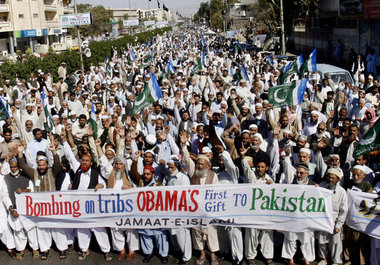 Yes he can
26.01.2009
Yes he can
26.01.2009
»Bomben – Obamas erstes Geschenk für Pakistan«: Demonstration am
Sonntag in Karachi
Auch US-Präsident Barack Obama läßt Zivilisten in Pakistan und Afghanistan töten. Regierungen in Islamabad und Kabul protestieren.
Von Knut Mellenthin
Killing as usual: Der 44. Präsident der USA setzt die Kriegführung seines Vorgängers fort. Erstmals seit dem Amtsantritt von Barack Obama griffen am Freitag unbemannte US-amerikanische Kampfflugzeuge, sogenannte Drohnen, wieder Ziele in Nordwestpakistan an. Der erste Luftschlag richtete sich gegen ein Gebäude am Rand von Mir Ali in Nordwasiristan, der zweite zerstörte wenige Stunden später ein Haus bei Wana, dem Hauptort von Südwasiristan. Bisher wurden insgesamt 21 Tote gezählt. Unter den Todesopfern in Mir Ali sollen sich vier oder fünf »Araber« und vier Pakistaner aus einer anderen Region des Landes befunden haben. Das Haus bei Wana gehörte laut pakistanischen Medien und örtlichen Offiziellen einem regierungsfreundlichen Stammesältesten, der zusammen mit mehreren Familienangehörigen, darunter seine drei Söhne und ein fünfjähriges Enkelkind, ums Leben kam. (...)
Barack Obama hatte schon im Wahlkampf angekündigt, daß er
als Präsident diese Angriffe fortsetzen werde. Die pakistanische Regierung und
die demokratischen Parteien des Landes hatten trotzdem darauf gehofft, daß der
neue Mann im Weißen Haus diese von ihnen immer wieder entschieden abgelehnten
Verletzungen der pakistanischen Souveränität überprüfen und ändern werde.
Pakistans Präsident Asif Ali Zardari, der Witwer der im Dezember 2007 bei einem
Anschlag getöteten Benazir Bhutto, appellierte am Wochenende an Obama, die
»kontraproduktiven« Raketenangriffe auf die sogenannten Stammesgebiete zu
beenden. Im selben Sinn äußerten sich auch das pakistanische Außenministerium
und führende Militärs in Islamabad.
Obama will den Schwerpunkt des US-amerikanischen »Kriegs gegen den Terror« noch
eindeutiger als sein Vorgänger nach Afghanistan und Pakistan verschieben, die
jetzt schon »ein einheitlicher Kriegsschauplatz« seien. Noch in der Amtszeit von
Bush wurden Vorbereitungen getroffen, um bis zum Frühjahr 20000 bis 30000
zusätzliche Soldaten nach Afghanistan zu verlegen. Das bedeutet annähernd eine
Verdoppelung der dort stationierten amerikanischen Streitkräfte. ...
Biden Indicates US Attacks in Pakistan Will Continue January 25, 2009
New VP Won't Comment on Latest Strikes
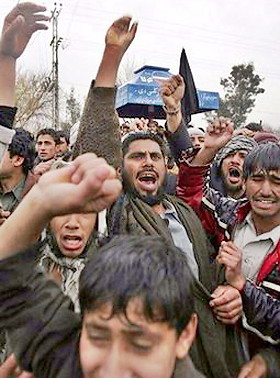 Karzai Confirms: US Forces Killed 16 Civilians January
25, 2009
Karzai Confirms: US Forces Killed 16 Civilians January
25, 2009
Afghans Protest Against US on Civilian Deaths Report
Thousands of Afghan villagers across Laghman Province rallied to protest against the latest incident of US troops killing innocent civilians. Protesters condemned both the US forces and President Hamid Karzai’s government, demanding that troops end a military operation that killed around 1,100 civilians in 2008 alone. ...
Pakistan urges Obama to halt missile attacks January 24, 2009
Pakistan urges Obama to halt missile strikes, says latest attack
killed civilians
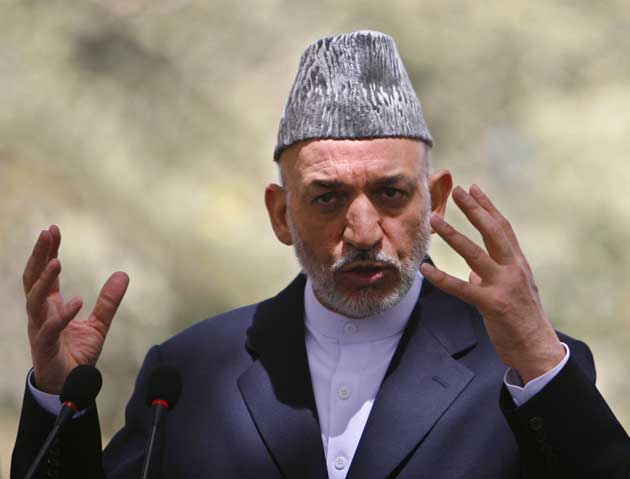 Obama ready to cut Karzai adrift 23 January 2009
Obama ready to cut Karzai adrift 23 January 2009
Afghan leader Hamid Karzai may find
himself on the receiving end of President
Obama's axe-wielding
As support for Afghan leader wanes, rivals go to Washington
for meeting with new President
By Jerome Starkey and Kim Sengupta in Kabul
Barack Obama's arrival in the White House and the wind of change sweeping through Washington could lead to the ousting from power of Hamid Karzai, President of Afghanistan, The Independent has learnt.
... There is now talk of a "dream ticket" that would see the main challengers run together to unite the country's various ethnic groups and wrest control away from Mr Karzai.
"The Americans aren't going to determine the outcome of the election, but they could suggest to people they put their differences aside and form a dream ticket," said a senior US analyst in Kabul.
Mr Obama has already started getting to grips with the challenge of Afghanistan; he received a briefing on the coming American troop "surge" from General David Petraeus on Wednesday, his first full day in the Oval Office. Last night, Mr Obama appointed the veteran US diplomat, Richard Holbrooke, as his new special envoy for Afghanistan and Pakistan. ...
On the ground in Afghanistan, Camp Bastion in Helmand province is already becoming the symbol of the Americanisation of the war in the south. US forces have started arriving and will be joined by many more. Airfields are to be built to bring in transport and warplanes in preparation for a coming offensive with the dispatch of 30,000 additional troops to Afghanistan. ...
Taliban in 72 pct of Afghanistan, think-tank says Dec 08, 2008
Jon Hemming
KABUL, Dec 8 (Reuters) - The Taliban hold a permanent presence
in 72 percent of Afghanistan, a think-tank said on Monday, but NATO and the
Afghan government rejected the report, saying its figures were not credible.
The findings by the International Council on Security and Development (ICOS)
come in the wake of a series of critical reports on Western-led military and
development efforts to put an end to the seven-year Taliban insurgency in
Afghanistan.
The U.S. government is conducting a wide-ranging review of strategy aimed at
countering the Taliban guerrilla and bombing campaign which analysts agree has
grown in both scale and scope in the last year. ...
USA schicken Tausende Soldaten nach Kabul 07.12.2008 (Spiegelonline)
Die USA schicken Tausende weiterer Soldaten nach Afghanistan. Nicht in den umkämpften Süden oder ins Grenzland zu Pakistan, sondern nach Kabul.
Siehe auch: U.S. Plans a Shift to Focus Troops on Kabul Region (NYTimes)
Afghanistan, Another Untold Story December 2, 2008
Barack Obama is on record as advocating a military escalation in Afghanistan. Before sinking any deeper into that quagmire, we might do well to learn something about recent Afghani history and the role played by the United States.
Less than a month after the 11 September 2001 attacks on the World Trade Center and the Pentagon, US leaders began an all-out aerial assault upon Afghanistan, the country purportedly harboring Osama bin Laden and his al Qaeda terrorist organization. More than twenty years earlier, in 1980, the United States intervened to stop a Soviet "invasion" of that country. Even some leading progressive writers, who normally take a more critical view of US policy abroad, treated the US intervention against the Soviet-supported government as "a good thing." The actual story is not such a good thing.
Since feudal times the landholding system in Afghanistan had remained unchanged, with more than 75 percent of the land owned by big landlords who comprised only 3 percent of the rural population. In the mid-1960s, democratic revolutionary elements coalesced to form the People's Democratic Party (PDP). In 1973, the king was deposed, but the government that replaced him proved to be autocratic, corrupt, and unpopular. It in turn was forced out in 1978 after a massive demonstration in front of the presidential palace, and after the army intervened on the side of the demonstrators.
The military officers who took charge invited the PDP to form a new government under the leadership of Noor Mohammed Taraki, a poet and novelist. This is how a Marxist-led coalition of national democratic forces came into office. "It was a totally indigenous happening. Not even the CIA blamed the USSR for it," writes John Ryan, a retired professor at the University of Winnipeg, who was conducting an agricultural research project in Afghanistan at about that time.
The Taraki government proceeded to legalize labor unions, and set up a minimum wage, a progressive income tax, a literacy campaign, and programs that gave ordinary people greater access to health care, housing, and public sanitation. Fledgling peasant cooperatives were started and price reductions on some key foods were imposed.
The government also continued a campaign begun by the king to emancipate women from their age-old tribal bondage. It provided public education for girls and for the children of various tribes.
A report in the San Francisco Chronicle (17 November 2001) noted that under the Taraki regime Kabul had been "a cosmopolitan city. Artists and hippies flocked to the capital. Women studied agriculture, engineering and business at the city's university. Afghan women held government jobs--in the 1980s, there were seven female members of parliament. Women drove cars, traveled and went on dates. Fifty percent of university students were women."
The Taraki government moved to eradicate the cultivation of opium poppy. Until then Afghanistan had been producing more than 70 percent of the opium needed for the world's heroin supply. The government also abolished all debts owed by farmers, and began developing a major land reform program. Ryan believes that it was a "genuinely popular government and people looked forward to the future with great hope."
But serious opposition arose from several quarters. The feudal landlords opposed the land reform program that infringed on their holdings. And tribesmen and fundamentalist mullahs vehemently opposed the government's dedication to gender equality and the education of women and children.
Because of its egalitarian and collectivist economic policies the Taraki government also incurred the opposition of the US national security state. Almost immediately after the PDP coalition came to power, the CIA, assisted by Saudi and Pakistani military, launched a large scale intervention into Afghanistan on the side of the ousted feudal lords, reactionary tribal chieftains, mullahs, and opium traffickers.
A top official within the Taraki government was Hafizulla Amin, believed by many to have been recruited by the CIA during the several years he spent in the United States as a student. In September 1979, Amin seized state power in an armed coup. He executed Taraki, halted the reforms, and murdered, jailed, or exiled thousands of Taraki supporters as he moved toward establishing a fundamentalist Islamic state. But within two months, he was overthrown by PDP remnants including elements within the military.
It should be noted that all this happened before the Soviet military intervention. National security adviser Zbigniew Brzezinski publicly admitted--months before Soviet troops entered the country--that the Carter administration was providing huge sums to Muslim extremists to subvert the reformist government. Part of that effort involved brutal attacks by the CIA-backed mujahideen against schools and teachers in rural areas.
In late 1979, the seriously besieged PDP government asked Moscow to send a contingent of troops to help ward off the mujahideen (Islamic guerrilla fighters) and foreign mercenaries, all recruited, financed, and well-armed by the CIA. The Soviets already had been sending aid for projects in mining, education, agriculture, and public health. Deploying troops represented a commitment of a more serious and politically dangerous sort. It took repeated requests from Kabul before Moscow agreed to intervene militarily.
The Soviet intervention was a golden opportunity for the CIA to transform the tribal resistance into a holy war, an Islamic jihad to expel the godless communists from Afghanistan. Over the years the United States and Saudi Arabia expended about $40 billion on the war in Afghanistan. The CIA and its allies recruited, supplied, and trained almost 100,000 radical mujahideen from forty Muslim countries including Pakistan, Saudi Arabia, Iran, Algeria, and Afghanistan itself. Among those who answered the call was Saudi-born millionaire right-winger Osama bin Laden and his cohorts.
After a long and unsuccessful war, the Soviets evacuated the country in February 1989. It is generally thought that the PDP Marxist government collapsed immediately after the Soviet departure. Actually, it retained enough popular support to fight on for another three years, outlasting the Soviet Union itself by a year.
Upon taking over Afghanistan, the mujahideen fell to fighting among themselves. They ravaged the cities, terrorized civilian populations, looted, staged mass executions, closed schools, raped thousands of women and girls, and reduced half of Kabul to rubble. In 2001 Amnesty International reported that the mujahideen used sexual assault as "a method of intimidating vanquished populations and rewarding soldiers.'"
Ruling the country gangster-style and looking for lucrative sources of income, the tribes ordered farmers to plant opium poppy. The Pakistani ISI, a close junior partner to the CIA, set up hundreds of heroin laboratories across Afghanistan. Within two years of the CIA's arrival, the Pakistan-Afghanistan borderland became the biggest producer of heroin in the world.
Largely created and funded by the CIA, the mujahideen mercenaries now took on a life of their own. Hundreds of them returned home to Algeria, Chechnya, Kosovo, and Kashmir to carry on terrorist attacks in Allah's name against the purveyors of secular "corruption."
In Afghanistan itself, by 1995 an extremist strain of Sunni Islam called the Taliban---heavily funded and advised by the ISI and the CIA and with the support of Islamic political parties in Pakistan---fought its way to power, taking over most of the country, luring many tribal chiefs into its fold with threats and bribes.
The Taliban promised to end the factional fighting and banditry that was the mujahideen trademark. Suspected murderers and spies were executed monthly in the sports stadium, and those accused of thievery had the offending hand sliced off. The Taliban condemned forms of "immorality" that included premarital sex, adultery, and homosexuality. They also outlawed all music, theater, libraries, literature, secular education, and much scientific research.
The Taliban unleashed a religious reign of terror, imposing an even stricter interpretation of Muslim law than used by most of the Kabul clergy. All men were required to wear untrimmed beards and women had to wear the burqa which covered them from head to toe, including their faces. Persons who were slow to comply were dealt swift and severe punishment by the Ministry of Virtue. A woman who fled an abusive home or charged spousal abuse would herself be severely whipped by the theocratic authorities. Women were outlawed from social life, deprived of most forms of medical care, barred from all levels of education, and any opportunity to work outside the home. Women who were deemed "immoral" were stoned to death or buried alive.
None of this was of much concern to leaders in Washington who got along famously with the Taliban. As recently as 1999, the US government was paying the entire annual salary of every single Taliban government official. Not until October 2001, when President George W. Bush had to rally public opinion behind his bombing campaign in Afghanistan did he denounce the Taliban's oppression of women. His wife, Laura Bush, emerged overnight as a full-blown feminist to deliver a public address detailing some of the abuses committed against Afghan women.
If anything positive can be said about the Taliban, it is that they did put a stop to much of the looting, raping, and random killings that the mujahideen had practiced on a regular basis. In 2000 Taliban authorities also eradicated the cultivation of opium poppy throughout the areas under their control, an effort judged by the United Nations International Drug Control Program to have been nearly totally successful. With the Taliban overthrown and a Western-selected mujahideen government reinstalled in Kabul by December 2001, opium poppy production in Afghanistan increased dramatically.
The years of war that have followed have taken tens of thousands of Afghani lives. Along with those killed by Cruise missiles, Stealth bombers, Tomahawks, daisy cutters, and land mines are those who continue to die of hunger, cold, lack of shelter, and lack of water.
While claiming to be fighting terrorism, US leaders have found other compelling but less advertised reasons for plunging deeper into Afghanistan. The Central Asian region is rich in oil and gas reserves. A decade before 9/11, Time magazine (18 March 1991) reported that US policy elites were contemplating a military presence in Central Asia. The discovery of vast oil and gas reserves in Kazakhstan and Turkmenistan provided the lure, while the dissolution of the USSR removed the one major barrier against pursuing an aggressive interventionist policy in that part of the world.
US oil companies acquired the rights to some 75 percent of these new reserves. A major problem was how to transport the oil and gas from the landlocked region. US officials opposed using the Russian pipeline or the most direct route across Iran to the Persian Gulf. Instead, they and the corporate oil contractors explored a number of alternative pipeline routes, across Azerbaijan and Turkey to the Mediterranean or across China to the Pacific.
The route favored by Unocal, a US based oil company, crossed Afghanistan and Pakistan to the Indian Ocean. The intensive negotiations that Unocal entered into with the Taliban regime remained unresolved by 1998, as an Argentine company placed a competing bid for the pipeline. Bush's war against the Taliban rekindled UNOCAL's hopes for getting a major piece of the action.
Interestingly enough, neither the Clinton nor Bush administrations ever placed Afghanistan on the official State Department list of states charged with sponsoring terrorism, despite the acknowledged presence of Osama bin Laden as a guest of the Taliban government. Such a "rogue state" designation would have made it impossible for a US oil or construction company to enter an agreement with Kabul for a pipeline to the Central Asian oil and gas fields.
In sum, well in advance of the 9/11 attacks the US government had made preparations to move against the Taliban and create a compliant regime in Kabul and a direct US military presence in Central Asia. The 9/11 attacks provided the perfect impetus, stampeding US public opinion and reluctant allies into supporting military intervention.
One might agree with John Ryan who argued that if Washington had left the Marxist Taraki government alone back in 1979, "there would have been no army of mujahideen, no Soviet intervention, no war that destroyed Afghanistan, no Osama bin Laden, and no September 11 tragedy." But it would be asking too much for Washington to leave unmolested a progressive leftist government that was organizing the social capital around collective public needs rather than private accumulation.
US intervention in Afghanistan has proven not much different from US intervention in Cambodia, Angola, Mozambique, Ethiopia, Nicaragua, Grenada, Panama, and elsewhere. It had the same intent of preventing egalitarian social change, and the same effect of overthrowing an economically reformist government. In all these instances, the intervention brought retrograde elements into ascendance, left the economy in ruins, and pitilessly laid waste to many innocent lives.
The war against Afghanistan, a battered impoverished country, continues to be portrayed in US official circles as a gallant crusade against terrorism. If it ever was that, it also has been a means to other things: destroying a leftist revolutionary social order, gaining profitable control of one of the last vast untapped reserves of the earth's dwindling fossil fuel supply, and planting US bases and US military power into still another region of the world.
In the face of all this Obama's call for "change" rings hollow.
U.S. eyes 'surge' of over 20,000 for Afghanistan 21.11.2008
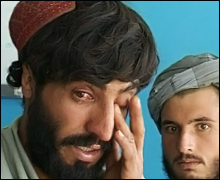 Workmen or militants? Row
over 14 killings by U.S. Army November 10, 2008
Workmen or militants? Row
over 14 killings by U.S. Army November 10, 2008
The U.S. military says it’s killed 14 militants in Afghanistan's eastern Khost province - but the province authorities say those killed were construction workers. The shootout happened as gunmen opened fire after U.S. troops stopped their vehicle.
It's the latest in a series of strikes as the Afghan Army and
coalition forces combat the Taliban in a country that's gearing up for
presidential elections next year.
Last week an American missile was said to have killed 40 civilians and wounded
28 others at a wedding party in the southern province of Kandahar.
“What have these innocent people done wrong,
the children and women who are now under rubble?” said local man Mohammad
Asim. “We saw their limbs thrown into the sky
during the bombing.” ...
UN Confirms 90 Afghan Civilians Killed in US Attack August 26, 2008
Following an investigation by their Assistance Mission for Afghanistan, the United Nations has announced that it is convinced that a minimum of 90 civilians were killed in Friday’s US airstrike in Herat Province. This number, they reported, included 60 children, and stands as one of the largest incidents of US-inflicted civilian casualties since the 2001 invasion.
The attack has done grave harm for support of both international troops and the Karzai government among the Afghan populace. President Karzai has attempted to mitigate the harm to his administration by firing a top army general and annoucing that his cabinet was reviewing the presence of NATO forces and would demand a formal agreement stipulating their authority.
NATO spokeswoman Carmen Romero however denied that they had been contacted by the Afghan government regarding any renegotiations, and said the presence was “on the basis of a United Nations mandate”. Moreover, Italian Foreign Minister Franco Frattini ruled out any possibility of foreign forces withdrawing from Afghanistan, insisting that at most it would lead to a different way of managing the presence of the nearly 70,000 foreign forces presently in Afghanistan.
The United States spent most of the weekend denying that any civilians were killed in the attack, which they initially claimed killed 30 militants, though they later revised that number to 25 militants and 5 civilians. The White House expressed “regret” for the deaths of innocent Afghans, while blaming the Taliban for “placing civilians in harm’s way”. The Pentagon defended the attack, despite the civilians casualties, as a “legitimate” assault on the Taliban. Afghan Minister Nematullah Shahrani disputed this account, however, and challenged the US to provide any proof that Taliban were at the site of the attack.
